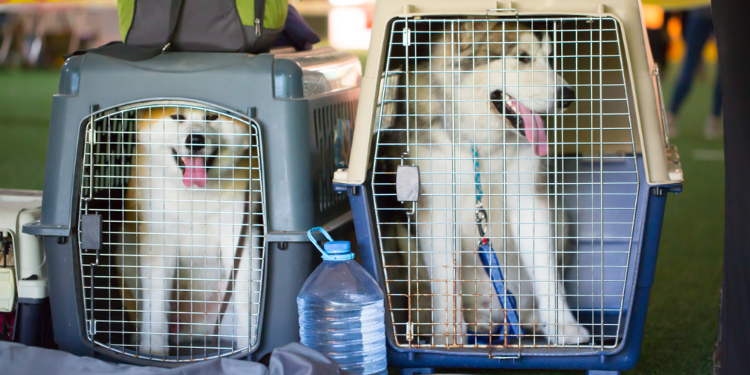
Bringing your pets along during your travels has always been cumbersome, requiring more planning, more paperwork, and considerable fees. With international pet relocation fees skyrocketing in various countries, expatriates have to rethink their plans. Here's what you need to know about the cost of moving abroad with pets.
Pet travel fees are surging in many countries
International pet relocation prices are on the rise in several countries, including the United Kingdom, France, and the United States. According to carriers, this is attributed to the "growing complexity" of pet transportation systems, primarily because of the stringent standards to ensure their well-being and safety. IAG Cargo (part of the International Airlines Group) in the UK and transportation services in other nations like France and Australia echo the same explanation.
In the spring of 2023, Air France raised its fares, specifically, as per its explanations, to meet customer expectations and provide the best care and safety for pets. Currently, relocating to mainland France with a cat or dog weighing less than 8kg costs 125 euros in the cabin and 200 euros in the hold, compared to the previous rates of 55 and 75 euros, respectively. It's important to note that these prices are applicable only for trips between mainland France and the rest of the world, Europe, and North Africa, as well as flights within Europe. For all other destinations, prices range from 200 euros for cabin travel and 400 euros for hold travel. Note that these prices are applicable only to small animals.
The case of IAG Cargo
The fee hikes at IAG Cargo are particularly alarming, with an increase of up to 400%, as noted by Kimberley Cirone, director of the British agency Pets Abroad UK. She finds it difficult to attribute these increases solely to animal welfare concerns. Cirone expresses her bewilderment in an interview with The New York Times. Dean Faulkner, director of the British agency Silver Birch Pet Jets, also acknowledges the same sharp increases, with certain destinations, mainly the USA and UK, being the most severely affected. Before the price surge, relocating overseas with a small pet cost approximately £1,200 (€1,400). Today, the price has more than doubled to £3,500 (€4,088) for the same journey. The rates are even higher for larger dogs, with IAG Cargo's new fees ranging from £11,000 to £12,000 (€12,800 to €14,000), compared to the previous £3,000 (€3,504).
How to select an airline when moving abroad with your pet
Prospective expatriates find it difficult to accept the explanations provided by airlines. Speaking to the BBC, Sara recounts how the cost of transporting her two small dogs from the USA to the UK via IAG Cargo rose from £1,143 to £5,118 (€1,335 to €5,978). In France, Air France's decision has sparked outrage among travelers. In response, an online petition was launched in 2023 to condemn the airline's practices, which are seen as contrary to animal welfare and likely to compel more pet owners to abandon the idea of relocating with their animals. Such abandonments would only add to the strain on pet foster homes. However, Air France stands by its decision, arguing that it hadn't increased prices since 2017 and that its rates are competitive with its rivals.
Conversely, airlines like Royal Air Maroc and Vueling are able to maintain competitive prices. Spanish low-cost carrier Vueling offers rates starting from 60 euros for international flights and flights to the Canary Islands, but, again, this applies only to animals weighing up to 8kg. The airline has recently adjusted its policy, reducing the maximum weight allowance for pets traveling from 10kg to 8kg. However, bookings made before June 20 will still be eligible for the previous maximum weight allowance of 10kg.
Royal Air Maroc authorizes small pets (up to a maximum weight of 8kg, including the container) to travel in the cabin for 70 euros to Europe or the Maghreb region and 120 euros to other destinations in Africa, the Middle East, and North America. Charges escalate based on the weight of the animal for travel in the hold, with a maximum weight limit of 70kg. For example, you would need to budget 520 euros for a hold flight with an animal weighing between 47 and 70kg.
Estimate the cost of relocating abroad with a pet
The term "pets" commonly refers to dogs and cats. In fact, some airlines may not accept other types of animals, such as rodents, reptiles, birds, amphibians, etc. It's advisable to check the regulations beforehand if you plan to relocate abroad with an "unconventional" pet. For instance, France and other European Union (EU) countries classify certain unconventional species as pets.
The animal can travel in the cabin (generally up to 8 or 10kg), in the hold (between 10 and 70kg), or as cargo (over 70kg). But each carrier or airline is free to determine its own rules for transporting pets, and set its own rates.
Pets need to be transported in carriers approved by the International Air Transport Association (IATA). The prices of carriers vary depending on their size, ranging from approximately 20 euros to over 120 euros and up to 180 euros for a cage suitable for a 50kg dog.
Additionally, every animal must be vaccinated, with the mandatory rabies vaccine costing between 50 and 70 euros. Other vaccinations may also be necessary, depending on the destination of the relocation.
When relocating to a European country, your pet must be identifiable, typically through a microchip, which costs around 50–60 euros. Additionally, your pet should have a European passport, which can cost approximately 15-20 euros, depending on the veterinarian who issues it. The European passport will include details of the anti-rabies vaccination.
There might also be a handling fee involved. For instance, South Africa imposes a charge of 150 rand (approximately 7.22 euros) for each imported animal.
The rates mentioned above are provided as an illustration. International pet travel fees can fluctuate based on factors such as the destination, the pet's weight, vaccination mandates, and the chosen mode of transportation. Relocating with a pet continues to be expensive, especially in light of recent decisions made by carriers.
Useful links
European Union (EU) : traveling with pets and other animals in the EU
US Centers for Disease Control and Prevention: traveling with pets



















